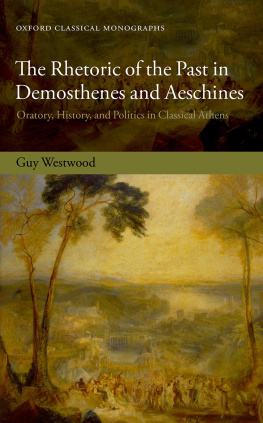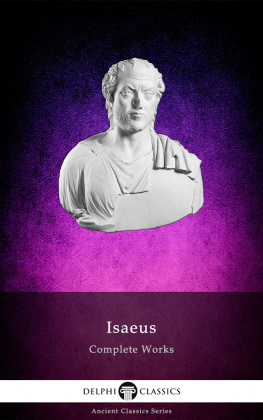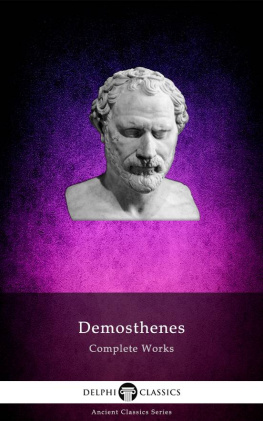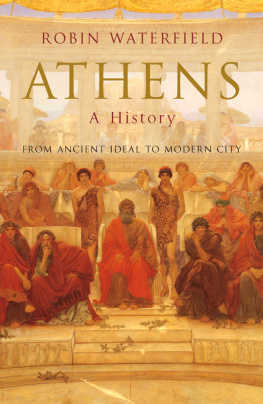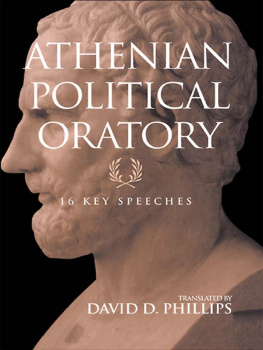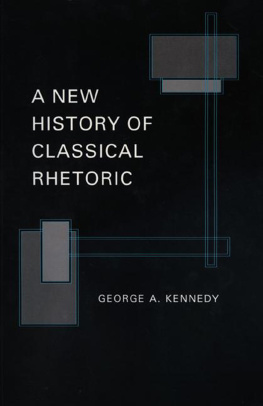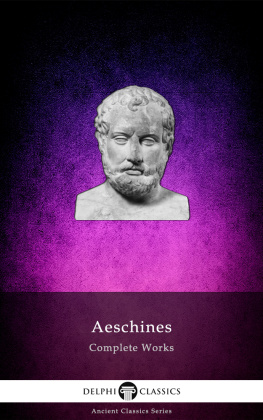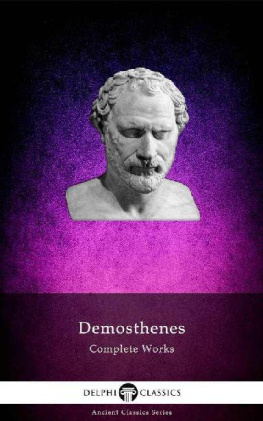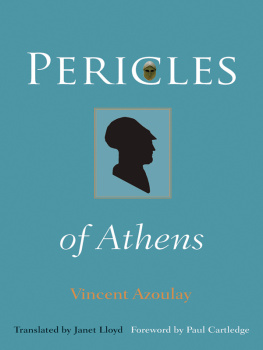Oxford Classical Monographs
Published under the supervision of a Committee of theFaculty of Classics in the University of Oxford
The aim of the Oxford Classical Monographs series (which replaces the Oxford Classical and Philosophical Monographs) is to publish books based on the best theses on Greek and Latin literature, ancient history, and ancient philosophy examined by the Faculty Board of Classics.

Great Clarendon Street, Oxford, OX2 6DP, United Kingdom
Oxford University Press is a department of the University of Oxford. It furthers the Universitys objective of excellence in research, scholarship, and education by publishing worldwide. Oxford is a registered trade mark of Oxford University Press in the UK and in certain other countries
Guy Westwood 2020
The moral rights of the author have been asserted
First Edition published in 2020
Impression: 1
All rights reserved. No part of this publication may be reproduced, stored in a retrieval system, or transmitted, in any form or by any means, without the prior permission in writing of Oxford University Press, or as expressly permitted by law, by licence or under terms agreed with the appropriate reprographics rights organization. Enquiries concerning reproduction outside the scope of the above should be sent to the Rights Department, Oxford University Press, at the address above
You must not circulate this work in any other form and you must impose this same condition on any acquirer
Published in the United States of America by Oxford University Press
198 Madison Avenue, New York, NY 10016, United States of America
British Library Cataloguing in Publication Data
Data available
Library of Congress Control Number: 2019950339
ISBN 9780198857037
ebook ISBN 9780192599124
Printed and bound in Great Britain by Clays Ltd, Elcograf S.p.A.
Links to third party websites are provided by Oxford in good faith and for information only. Oxford disclaims any responsibility for the materials contained in any third party website referenced in this work.
Acknowledgements
The doctoral thesis on which this book is based was written in 200913 under the supervision first of Gunther Martin and then of Chris Pelling. Gunther accepted me as a supervisee, and when he moved to a new post in 2010 (after which he kindly continued to read material), Chris took over and has remained a constant source of hugely valuable advice and general wisdom. I am very grateful to both of them for the criticisms, guidance, and encouragement they offered and continue to offer. The resulting thesis was examined by Chris Carey and Simon Hornblower in 2014, and I would like to extend my warm thanks to them and to Mike Edwards, and also to my advisers for the Press, Lisa Kallet and Alfonso Moreno, for their very helpful comments on the thesis version and on the resulting book version. Other readers of this material have included the Faculty-appointed assessors who read parts of the developing thesis for the official progression stages of the DPhil degree, Luke Pitcher and Tim Rood, and also Tobias Reinhardt (as overall supervisor of the MSt degree whose dissertation element, revised twice over, now appears as ). I am very glad to be able to thank them all here.
My thanks also go to Mirko Canevaro, Andrew Lintott, William Mack, Peter Rhodes, Richard Rutherford, Pietro Vannicelli, and the late George Cawkwell, who have all either willingly discussed aspects of Greek history and culture with me or read and commented on articles spinning off from the thesis and book, or both. Some of them have also kindly shared unpublished or forthcoming material (as have Jon Hesk, Hugo Koning, and Kathryn Tempest). Audiences in Cambridge, Durham, Edinburgh, Exeter, London, and Oxford have heard papers on the themes and/or subject matter of the thesis and book, and I record here my thanks to those who asked questions or offered comments on those occasions.
The thesis versionwritten at Merton College, Oxford, with the support of a Domus Scholarshipwas completed during a Stipendiary Lectureship at Magdalen College, and the work of conversion to a monograph was carried out during my tenure, first, of the Leventis Research Fellowship in Ancient Greek at Merton College (201317) (for election to which post, my thanks to the A. G. Leventis Foundation and to the college), then of a years Teaching Fellowship at the University of Birmingham, and, most recently, of a years Departmental Lectureship in the Classics Faculty and at St Hughs College, Oxford. In all these places I have been fortunate to work alongside supportive and good-humoured Classics colleagues, and I would like to record special thanks here to Andrew Bayliss, Felix Budelmann, Philip Burton, John Eidinow, Maeve McHugh, Hannah Mitchell, Gideon Nisbet, Jonathan Prag, Alberto Rigolio, Tim Rood (again), and Gareth Searsand above all to Rhiannon Ash, as generous and humane a senior colleague as I could have wished for during my time as a Merton tutor. Henriette van der Blom, Armand DAngour, John Davie, Peta Fowler, Adrian Kelly, and Rosalind Thomas have all provided (and continue to provide) guidance of different kinds, some of them from my earliest days as a student. Rosalind also read two chapters of the thesis version, while Adrian lent me a working laptop when my own failed abruptly at a key point in the summer of 2012. I am most grateful to them all.
Many other colleagues beyond Classics have sustained me with their company and insights along the way, and the regular denizens of the Merton SCR deserve particular collective recognition here. I have also been extremely fortunate in my students at Magdalen, at Merton, in Birmingham, at St Hughs, and also at Jesus (where I began my teaching) and other collegesthey have kept me on my toes and often sparked new lines of inquiry. Finally, it is a pleasure to be able to make special mention of some friends whose company has added immensely to the experience of working on the thesis, or writing the book, or teaching, or all of them: Linda Briggs, Aneurin Ellis-Evans, Katie Low, Tom Phillips (for several years now an unfailingly stimulating discussion partner on many topics), and Antony Smith. Little of what follows would have been possible, though, without the love and ongoing support of my parents, and I dedicate this book to them as a sign of my deep gratitude.
Contents
Editions
For the orators, and except where otherwise stated, I use Dilts (1997) for Aeschines; Dilts and Murphy (2018) for Andocides and Antiphon; Dilts (2002), (2005), (2008), and (2009) for Demosthenes speeches and Clavaud (1974b) and (1987) for his Prooemia, Letters, and fragments; Conomis (1975) for Dinarchus; Jensen (1917) for Hyperides 16 (designated by abbreviated speech titles) and Horvth (2014) for Against Diondas; Thalheim (1903) for Isaeus; Mathieu and Brmond (192962) for Isocrates; Conomis (1970) for Lycurgus; Carey (2007) for Lysias. Entirely fragmentary orators are quoted from the citing source in each case; these fragments follow Sauppes numbering (1850). I also use Dilts (1992) for the scholia to Aeschines and Dilts (19836) for the scholia to Demosthenes; Kassel/Austin (below) for all comic fragments; Stuart Jones rev. Powell (1942) for Thucydides; Ziegler (196098) (and his paragraph numbering) for Plutarchs Lives

